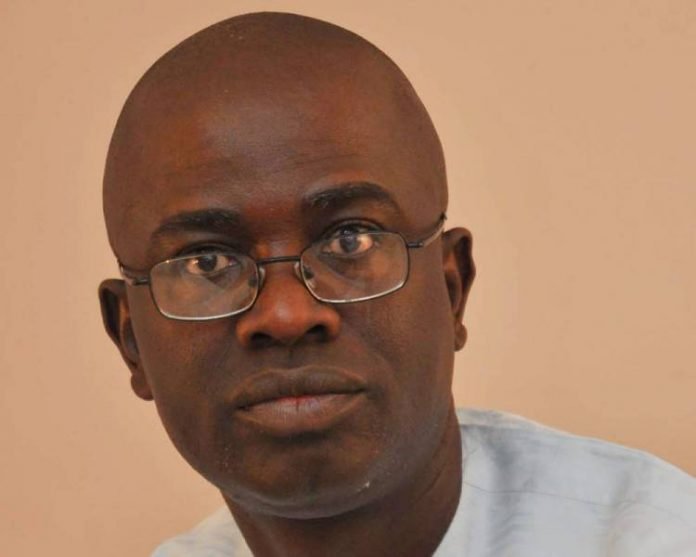At the parent-teacher session in a school, a mother was told that her son didn’t always pay attention in class. “For example, he’ll do the wrong page in the workbook”, explained the teacher, “he will not submit assignments on due dates and I have even found him sitting in the wrong desk.”
“I don’t understand that,” the mother replied defensively, “Where could he have gotten that from?”
The teacher went on to reassure the mother that her son was still doing fine in school and was sweet and likeable. Finally, after a pause, the teacher added, “By the way, Mrs Johnson, my appointment with you was for tomorrow.”
The chairman of this occasion, distinguished ladies and gentlemen, I am sure we all know the import of that story. Whether we admit it or not, our children are more a reflection of us than we imagine. But first, let me specially thank my brother, Fola and his lovely wife, Mrs Bose Adekeye not only for inviting me here today but also for the wonderful breakfast to which I was treated at their home this morning. I also appreciate the staff and management of Champions International School, Magboro for the wonderful job you are doing.
Distinguished ladies and gentlemen, I am delighted to be among you today to celebrate ‘Father’s Day’ and the launching of the book, ‘FOOTPRINTS: The Growing Challenges of Parenting’, written by the Adekeyes. It is particularly noteworthy that some mothers are also here today and I thank them for coming. I have been asked to speak on ‘Raising Children for Greatness-Overcoming 21st Century Challenges” but what I want to do is to speak from the heart as a father so that we can have a meaningful conversation in the engagement that, I have been told, will follow my presentation.
Parenting or being a father is a very difficult task and if the report card I got last year from my own daughter is anything to go by, then I am not qualified to be here to be speaking here today. I thank God every day for my wonderful wife who happens to be a fantastic mother to our children, just like many mothers that we have here today. But I want to share a story I am not particularly proud of but one which I believe fathers like me can learn from and then I will take a few questions before I take my leave and head back to Abuja.
I have three children. The first two are girls while the last is a boy. The younger girl and boy are currently senior secondary school students at Loyola Jesuit College, Abuja but the story I am about to share concerns the eldest who is 18 and currently learning Mandarin at the Beijing Culture and Language University in China preparatory to starting her degree programme by September this year.
Early last year, while still in her final year at Trinity College, Ofada in Ogun State, (not far from here, I guess) she was applying for admission into some universities abroad and she needed to write an essay. I recall her mom had told her to avail me her draft so I could help review for her and she mailed it to me. Titled, ‘Learning to Accept Criticism’, the essay was good but I felt a bit uncomfortable about the slant.
To understand my apprehension, let me quote just one paragraph from her essay: “…Now, I have come to the conclusion that every criticism counts and it was not an easy thing to accept. My biggest critic happens to be my dad, an editor and writer. Most of what I have ever written has either been labeled ‘rubbish’ or not good enough. I can vividly remember countless times I left my dad’s study in tears due to the harsh comments he made about my work only after reading a few lines…”
After reviewing the essay I sent it back with this comment: “Dear Toluwani, I have just read your amazing piece. It doesn’t make me feel good because I know I am always mild in judging other people’s writings. Besides, I know better than to condemn my own daughter’s work. But then, I understand that you are writing an essay for admission so I grant the liberty to be imaginative. Love you.”
Within a few hours I got this reply from my daughter who was then just 17 year old: “Dear daddy, when you said my essay was good I almost fainted; but when I opened the attachment and saw almost a paragraph gone I began to wonder, did you really think it was good or were you just saying it? I also realized God gave me an editor for a father for a reason. I plan to work on my spellings and expressions. But Dad, I want you to know that everything in that essay is true; you were harsh with me and caused me to fear showing you my work but now I know it is so I can produce my best. I cried many times in the past but today is the last day I will cry because of a work you have reviewed. I love you daddy.”
I found the mail very disturbing. I had prided myself as a good father. I am close to my children and I always give then my time and attention. But here was my daughter telling me of my failure as a father. Even though I sent her a heartfelt letter of apology, I could not but reflect on the fact that while growing up, where the relationship between me and my father were concerned, I could never have questioned how he treated me. But we are raising children of a generation different from ours, children who insist that they be heard, and we must adapt to changing circumstances. ‘Aiye n lo, a n too’, as the Yoruba people would say.
I am sharing this story because our children know us more than we imagine and there are assumptions that we (fathers) make that may just not be true. That is why I strongly recommend the book that will be launched today because it contains useful tips that could help parents navigate tricky situations with their children.
Distinguished ladies and gentlemen, to the extent that the children of today are the leaders, teachers, doctors, lawyers, judges, as well as followers, criminals and the homeless of tomorrow, the words we speak and the actions we take as we raise them will shape their well-being, capacity, perspective and influence in the world. As if that in itself is not pressure enough for parents, the revolution in communication technology of recent years now make things even more challenging. All this imposes enormous responsibility on us as parents.
The first lesson we must learn is never to compare one child to the other. ‘Ti a ba fi omo we omo, a o lu okan pa’. That is another Yoruba adage which warns that the temptation to equate one child’s ability to another must be resisted at all cost otherwise, we may destroy what we are trying to build.
For sure, competition has always been a hallmark for many dutiful parents; remarkably, in today’s world we tend to measure our children by their peers, even when we pretend otherwise. Consciously or not, there seems to be a benchmark we always reach out for when we want our children to behave in a certain way or attain certain levels of success. While that may not be bad in itself, we need to keep in mind that every child is an individual with their own peculiar strengths and weaknesses.
Since it is easy for young people to be defeated in their mind, thereby conforming to their reality, we need to help build the confidence of our children to ensure that they are capable of handling the challenges they will face in their space when we, as parents are not there. The best way to play our role in that regard is to always get updated on issues affecting our children’s view of the world – and we can only do that if we consider bonding with them.
One of the greatest benefits of the digital age is the liberalization of information and entertainment on the internet. It is also one of the greatest headaches when it comes to parenting. Children that own mobile phones, laptops and tablets now have access to all kinds of media content that may not be suitable viewing for their age. Yet it has become more difficult and some may say impossible for parents to control or supervise the sort media images that their children are consuming.
Safety has to be paramount for parents. However, again no thanks to technology, children are not only left exposed to harmful content but also to people that are looking to do harm or take undue advantage of their innocence and inexperience. In the past, we only had to worry about strangers on the streets, now we have to worry about cyber bullies, cyber terrorists, religious fanatics, cyber perverts and all sorts of deviants and criminals on the internet that threaten the safety of children.
Digital technology has enabled online predators to track the location and activities of targeted child victims. It has also enabled them with more effective tools of deception and manipulation. Parents now need to be aware of their children’s online interactions, presentation and activity. Conduct and public image are also key to an individual’s character as they grow into adulthood. That’s why it is important to educate children to pay attention to the way they present themselves both off and online but especially online where records of their actions may prove impossible to delete or erase. The internet, as the saying goes, does not forget.
Nowadays, schools, employers, business partners and many others take into account social media behaviour of applicants, suppliers and business partners before entering a relationship with that individual. Wrong perceptions based on what is put out there could derail a promising opportunity in the future and stunt greatness. So our task as parents in this regard is to ensure they are more guided than ever in their actions and utterances.
The confidence level of any individual is a key factor for success in any endeavor and throughout life. Raising tomorrow’s leaders involves building their confidence starting from now. Furthermore, we need to ensure our children are programmed to learn on their own and constantly update their skills rather than seeing education as finite journey that is concluded once you are done with University. These days the notion of University education as being sufficient and in some cases a pre-requisite to career success is quickly dissipating.
It is also important to highlight the shifting dynamics of marital relationships in the 21st century. Marital roles are being redefined based on the growth of female empowerment and movement towards gender equality. Women are no longer satisfied just to sit at home as the designated housewives tending to the children as our mothers did back in the day. Raising children for greatness in this wave of socio-cultural destabilization requires a high degree of tact and balance to prevent disaffection. Both parents have to be equally involved and invest more time and resources in their children.
As I conclude my presentation, I believe the most important thing that we need to realize in raising our children for greatness in the 21st century is that we can’t be everywhere and control what they see and hear as much as we could before we entered into the digital age we are in now. The best approach we could have now is to help shape their perspective in this new age, instill the right attitude and equip them with psychological and emotional tools to handle the deluge of communication to which they are now confronted.
Above all, we must learn to have open and honest conversations with our children. Regardless of what they are watching or doing, helping them to contextualize their experiences will serve them better than futile efforts to shield them. They also need to understand the world we live in today relative to where we are coming from and what it used to be. For us the world as we knew it before internet and mobile devices is over but for children growing up on this era, it’s all that they know. Therefore they may not fully comprehend the pitfalls of living through this age and the dangers of thoughtless immersion into an impending virtual World. It is our responsibility to guide them and we cannot do that by living in denial.
Distinguished ladies and gentlemen, as I take my seat, I am sure many of us followed the fall-out of the Offa robbery tragedy in Kwara State in which Kayode, the 38 year old son of respected Afenifere chieftain, Mr Ayo Opadokun was arrested as one of the suspects. Prof Olatunji Dare recently wrote Opadokun an open letter in his column that I believe all parents must read because it speaks to the place of providence still in how our children turn out.
Parenting, according to Dare, “is one of the most demanding and trickiest tasks a person can undertake. And yet, paradoxically, it is never taught. You learn on the job as it were, guided but not always to the most salubrious degree by the examples of your own parents, by your inner lights, by your observations of other families, and by a thousand other influences.”
However, as Dare concludes, regardless of the best efforts by parents, no outcome is guaranteed. “Here, the common wisdom that the apple never falls far from the tree may well be false, at least in a literal sense. A child reared in a home that sets the highest store by rectitude can grow into a wayward adult; vice versa, though this outcome is rarer, a child brought up in the most dissolute of homes can grow up into a fine, morally upright person…Peer pressure and hundreds of other factors render a particular outcome more uncertain still. So that, if a son or daughter shuns the usual vices, comes across as a person of good report and generally stays away from trouble, we should give thanks for our good fortune. Rejoice. But we must heap no blame on those parents whose children grew wayward” wrote Dare.
What that says most clearly is that at the end of the day, we should never forget the God Factor as we raise our children. For sure, we must instil in them the right values and be to them moral examples. But we must also be conscious of the fact that there is only so much that we can do as human beings. That is why we must pray every day for God to continue to watch over them. That is our greatest responsibility as parents. May God shield our children from the evil ones and may He bless all of us.
Thank you very much for listening and Happy Father’s Day
– Text of my keynote speech at the Father’s Day ceremony of Champions International Schools, Magboro, Ogun State, on Saturday, 16th June, 2016.





